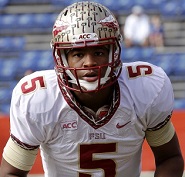 Jameis Winston was never charged with sexual assault late last year after he was accused of raping a woman on Dec. 7, 2012. The state attorney determined that there was not enough evidence against Winston to file a charge, and he later went on to lead Florida State to a BCS National Championship. But is he out of the woods?
Jameis Winston was never charged with sexual assault late last year after he was accused of raping a woman on Dec. 7, 2012. The state attorney determined that there was not enough evidence against Winston to file a charge, and he later went on to lead Florida State to a BCS National Championship. But is he out of the woods?
According to a report Deadspin published on Thursday, Florida State has conducted its own independent investigation of the incident with what is called a Title IX investigation. As a result, FSU players Chris Casher and Ronald Darby were recently charged with five violations of the school’s code of conduct. Winston, however, is not facing any sanctions from the university.
Casher and Darby both gave signed affidavits to legal investigators heavily supporting the notion that Winston’s alleged victim was a willing participant. Both said they watched Winston having sex with his accuser and Casher admitted to filming the act on his cell phone. He said he later deleted the video.

As a result, Casher and Darby face FSU charges of “conduct of a sexual nature that creates an intimidating, hostile, or offensive environment for another person” and “acts that invade the privacy of another person.” Casher is also charged with “recording images without consent.”
So why have Casher and Darby been charged by the school but not Winston? Because Jameis didn’t say anything. According to Deadspin’s source, Winston was called to a meeting with FSU dean of students Jeanine Ward-Roof and others in January. Winston said at the meeting that his legal team advised him to say nothing.
According to the source, Ward-Roof later said that she would have asked Winston if he had obtained consent for sex on the night of the incident, if he knew about alcohol impairment, and if he knew what “consent” meant. But the star athlete declined to cooperate.
Instead, the meeting became “an educational conversation” in which Winston was advised of the university’s definition of consent, its alcohol policies, and its code of conduct.
The administrators concluded that without Winston’s cooperation there was insufficient evidence to support a finding of a Title IX violation at that time, but that “conduct code charges could be issued” if additional information about the incident became available.
Should more information become available, the school still reserves the right to call Winston to a hearing. It is unclear what the punishment for Casher and Darby will be, though sanctions could include anything from a letter of reprimand to expulsion. For now, Winston remains in the clear.

